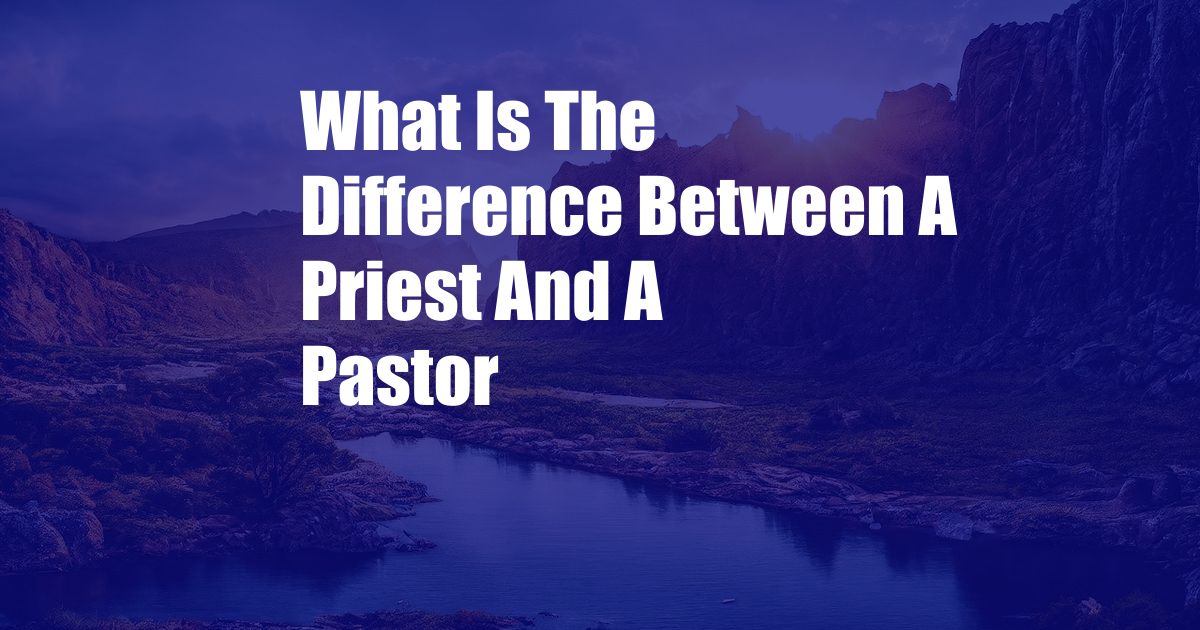
The Difference Between a Priest and a Pastor
Growing up, I would often get the terms “priest” and “pastor” mixed up. I wasn’t sure if they were different job titles for the same position or if they represented two distinct roles within the church. It wasn’t until I became an adult and started attending church regularly that I finally learned the difference between the two. I’ll do my best to explain in this article what I have learned.
In the Christian tradition, priests and pastors are both ordained ministers who lead and serve their congregations. However, there are some key differences between the two roles.
Priests
Priests are ordained ministers in the Catholic Church and other apostolic Christian denominations such as the Eastern Orthodox, Anglican, and Lutheran churches. They are responsible for performing the sacraments, such as baptism, confirmation, and the Eucharist. Priests also typically lead worship services, deliver sermons, and provide pastoral care to their parishioners.
Priests typically study theology and philosophy at a seminary or other theological institution before being ordained. They must also be celibate and take vows of obedience and poverty. A priest often refers to males, and a female priest is often called a mother.
Pastors
Pastors, on the other hand, are ordained ministers in Protestant denominations. They are responsible for leading their congregations in worship, preaching, and teaching the Bible. Pastors also typically provide pastoral care to their parishioners and may be involved in other church activities, such as youth ministry or outreach programs.
Pastors typically study theology at a seminary or other theological institution before being ordained. They do not have to be celibate and can marry and have families. Pastors are usually called by their first name. In some denominations, pastors need to be male, while others can be females.
Theological Differences
In addition to their different roles and responsibilities, priests and pastors also have different theological understandings of their ministry. Priests believe that they are ordained by God to perform the sacraments and that they have special authority to do so. Pastors, on the other hand, believe that they are called by God to preach the Bible and to lead their congregations in worship.
Historical Development
The distinction between priests and pastors emerged in the early church. In the first centuries of Christianity, all ordained ministers were known as priests. However, as the church grew and became more organized, different roles began to emerge. In the Catholic Church, the distinction between priests and bishops developed, with bishops being responsible for overseeing the work of priests. In the Protestant Reformation, the role of the pastor became more prominent, as pastors were seen as leaders of the local church.
Conclusion
While priests and pastors have different roles and responsibilities, they are both essential to the life of the church. They are both called by God to serve their congregations and to lead them in worship, teaching, and pastoral care. I hope this article has helped you to understand the difference between priests and pastors. If you have any further questions, please feel free to ask in the comments below.
Are you interested in learning more about the roles of priests and pastors? Here are some additional resources that you may find helpful.
- What is the difference between a priest and a pastor?
- What is the difference between a priest and a pastor?
- What is the difference between a priest and a pastor?
FAQs
- What is the main difference between a priest and a pastor?
- What are the different roles of priests and pastors?
- What are the theological differences between priests and pastors?
The main difference between a priest and a pastor is that priests are ordained ministers in the Catholic Church and other apostolic Christian denominations such as the Eastern Orthodox, Anglican, and Lutheran churches. Pastors, on the other hand, are ordained ministers in Protestant denominations.
Priests are responsible for performing the sacraments, such as baptism, confirmation, and the Eucharist. They also typically lead worship services, deliver sermons, and provide pastoral care to their parishioners. Pastors, on the other hand, are responsible for leading their congregations in worship, preaching, and teaching the Bible. They also typically provide pastoral care to their parishioners and may be involved in other church activities, such as youth ministry or outreach programs.
Priests believe that they are ordained by God to perform the sacraments and that they have special authority to do so. Pastors, on the other hand, believe that they are called by God to preach the Bible and to lead their congregations in worship.